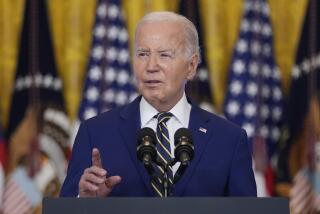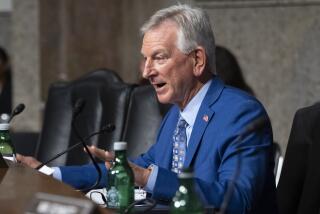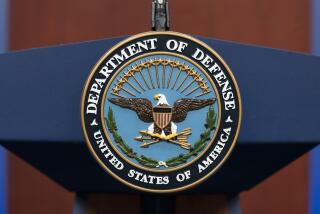Military curbs ‘don’t ask, don’t tell’ policy on gays
Reporting from Washington — Pentagon officials on Thursday unveiled new policies that will cut down on the number of service members expelled each year for being gay and admonished a top U.S. general for publicly opposing changes to the country’s controversial “don’t ask, don’t tell” policy.
The 1993 law banning gays and lesbians from serving openly requires the military to boot out members who acknowledge they are gay or are shown to be gay in formal hearings. About 13,000 have been discharged under the law.
But the changes announced by Defense Secretary Robert M. Gates will make it more difficult to expel gays, by restricting grounds for initiating an inquiry into a service member’s sexuality, limiting evidence that can be used against them and requiring that higher-ranking officers oversee the process.
“These changes represent an important improvement in the way the current law is put into practice, above all by providing a greater measure of common sense and common decency,” Gates said.
In announcing the new procedures, Gates took the first major step of a yearlong process. For the rest of the year, a task force will study what the military will need to do to repeal the ban and, for the first time, accommodate people of varying sexual preferences.
Adm. Michael G. Mullen, chairman of the Joint Chiefs of Staff, took the unusual step of publicly chastising a three-star general for urging troops and their families to oppose the repeal. Mullen said that remarks by Lt. Gen. Benjamin R. Mixon, the commander of U.S. Army forces in the Pacific who urged opposition in a letter to the editor, were “inappropriate.”
Opposition by military officers to gays serving openly in the military scuttled an attempt by former President Clinton’s to end the ban. Mullen, who has endorsed President Obama’s call to repeal the prohibition, has worked to ensure that military officers do not try to thwart the move.
Advocacy groups said the changes announced Thursday were an important step toward curbing what they see as abuses of the current law, but disagreed on its precise effects.
“We don’t want these changes to be seen as a substitute for full legislative repeal, but I don’t think the Pentagon wants that either,” said Alexander Nicholson, executive director of Servicemembers United, an organization of gay and lesbian veterans and troops.
Discharges will continue under the law. Advocates for gays and lesbians have urged Obama to issue an executive order suspending discharges under the “don’t ask, don’t tell” law. But Gates and others have cautioned against taking drastic action until the military completes its yearlong review.
Nathaniel Frank, a senior research fellow at the Palm Center at UC Santa Barbara, said Gates’ message was that gays could serve in the military without harm to the force.
“What they did is create scenarios where people who are known to be gay can continue to serve,” Frank said. Allowing those service members to serve could build political momentum for a broader repeal, he added.
Under the changes announced by Gates, only general or flag officers -- meaning admirals or generals -- can initiate an inquiry into whether a service member is gay. Although fact-finding can be conducted by a lieutenant colonel or Navy commander, only general or flag officers can discharge a service member who is found to be gay.
Accusations against a service member must now be given under oath, and charges leveled as retaliation by third parties, such as former romantic partners, will be looked on more skeptically and, as evidence, considered less than reliable.
Gates’ order also ends the practice under which information provided to lawyers, clergy, physicians and psychotherapists could be used as evidence against service members accused of being gay.
Obama said in this year’s State of the Union address that he would pursue a repeal of the ban. Soon after, Gates announced he would review the ban and work on ways to make enforcement of the law more humane.
In the weeks since, the leaders of the major military branches all have testified before Congress about the ban. While none endorsed repeal as explicitly as Mullen, only Gen. James T. Conway, the Marine Corps commandant, has said the ban should stay in place.
Conway’s dissent did not irk Pentagon officials, who said the military’s joint chiefs are expected to offer their opinions when asked by members of Congress.
However, senior military leaders were surprised by the letter to the editor written earlier this month by Lt. Gen. Mixon.
In his letter to Stars and Stripes, a Pentagon-owned newspaper that is run independently, Mixon urged service members to write to their elected officials and chain of command to express their opposition to the repeal of the ban.
“If those of us who are in favor of retaining the current policy do not speak up, there is no chance to retain the current policy,” Mixon wrote.
Gates would not say whether he thought the letter represented criticism of the president, but called Mixon’s comments “inappropriate” for an active-duty officer.
Defense officials said that Gates had always encouraged ideas and dissent. But Gates was upset that Mixon had taken a political stand and that he had urged soldiers to adopt an advocacy role. “Secretary Gates wants to hear any and all views. The review depends on people being candid. But there is a proper way to voice a dissenting opinion,” said Pentagon Press Secretary Geoff Morrell.
Mullen said he had spoken with Gen. George W. Casey Jr., the Army chief of staff, about Mixon’s letter. “The issue is being addressed with him,” Mullen said of Mixon.
Mullen said that everyone in the military is obligated to follow the direction of the leadership. “If there is a policy direction that someone in uniform disagrees with . . . and you feel strongly about it, the answer is not advocacy; it is in fact to vote with your feet,” Mullen said.
A spokesman for Mixon referred questions to the Army Headquarters in Washington. Col. Thomas Collins, an Army spokesman, said Mixon’s comments were his own.
“Gen. Mixon’s comments do not reflect the Department of the Army’s position or thinking on this issue,” Collins said. “Gen. Mixon advocating through a newspaper does not seem to be consistent with what we are trying to accomplish with this comprehensive review.”
More to Read
Sign up for Essential California
The most important California stories and recommendations in your inbox every morning.
You may occasionally receive promotional content from the Los Angeles Times.










